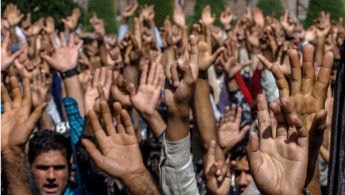A total of 31.1 million people were included in a National Register of Citizens (NRC), but 1.9 million were deemed ineligible, according to the Assam government. A large chunk of those excluded were expected to be Muslims.
Assam has long seen large influxes from elsewhere, including under British colonial rule and around Bangladesh's 1971 war of independence when millions fled into India.
For decades this has made Assam a hotbed of inter-religious and ethnic tensions. Sporadic violence has included the 1983 massacre of around 2,000 people.
Security was beefed up in Assam ahead of the release of the NRC, with some 20,000 extra personnel brought in and gatherings banned in some locations. There were no disturbances reported on Saturday however.
'Termites'
Only those who can demonstrate that they or their forebears were in India before 1971 could be included in the list.
But navigating the complex process is a huge challenge for many in a flood-prone poor region of high illiteracy where many lack documentation.
Indian Prime Minister Narendra Modi's Hindu nationalist Bharatiya Janata Party runs Assam - and critics say the NRC process reflects the BJP's goal to serve only its co-religionists.
In January India's lower house passed legislation that grants citizenship to people who moved to India as recently as six years ago -- as long as they are not Muslims.
This has stoked fears among India's 170-million Muslim minority for their future.
Home Minister Amit Shah, Modi's right-hand-man, has called for the ejection of "termites" and said before the BJP's thumping re-election victory in May that it would "run a countrywide campaign to send back the infiltrators".
On August 5 New Delhi suspended the autonomy of Indian-administered Kashmir. The Muslim-majority region is currently in its fourth week of a near-total communications blackout.
Those left off the NRC have 120 days to appeal at special Foreigners Tribunals, which the government says are being expanded in number.
But activists say that tribunal members are often underqualified and are subject to "performance" targets, and that the process has been riddled with inconsistencies and errors.
Instances of people being declared foreigners because of clerical errors, such as differences in the spelling of names, are "appallingly common," Amnesty International said Saturday.
The number of mistakes and the fact that those left off the NRC were expected to include large numbers of Bengali-speaking Hindus has also turned some in the BJP against the process.
With many "genuine Indians" left off, the party is mulling a "fresh strategy on how we can drive out the illegal migrants," said Himanta Biswa Sarma, a local BJP minister.
Camps and suicides
Those who have been rejected by the tribunals and have exhausted all other legal avenues can be declared foreigners and - in theory - be placed in one of six detention centres with a view to possible deportation, although Bangladesh is yet to signal its cooperation.
Ten new such camps have been announced. One with space for 3,000 is being constructed in Goalpara, west of Assam's biggest city Guwahati.
The camps currently hold 1,135 people, according to the state government, and have been operating for years.
Nur Mohammad, 65, spent almost 10 years in one such camp until a Supreme Court order saw him released this month.
"I was born here and lived in Assam all my life," he told AFP this week. "I don't know if my name will be in the NRC or not."
Media reports say that there have been more than 40 suicides caused by concern over the NRC.
Samujjal Bhattacharya from the All Assam Students' Union (AASU), a key driver behind the NRC, said the register was necessary to protect Assam's indigenous "sons of the soil".
"We are not ready to live here like a second-class citizens in our own motherland," he told AFP.
Follow us on Twitter: @The_NewArab





 Follow the Middle East's top stories in English at The New Arab on Google News
Follow the Middle East's top stories in English at The New Arab on Google News
![The UAE is widely suspected of arming the RSF militia [Getty]](/sites/default/files/styles/image_330x185/public/2024-11/GettyImages-472529908.jpg?h=69f2b9d0&itok=Yauw3YTG)
![Netanyahu furiously denounced the ICC [Getty]](/sites/default/files/styles/image_330x185/public/2024-11/GettyImages-2169352575.jpg?h=199d8c1f&itok=-vRiruf5)
![Both Hamas and the Palestinian Authority welcomed the ICC arrest warrants [Getty]](/sites/default/files/styles/image_330x185/public/2024-11/GettyImages-2178351173.jpg?h=199d8c1f&itok=TV858iVg)